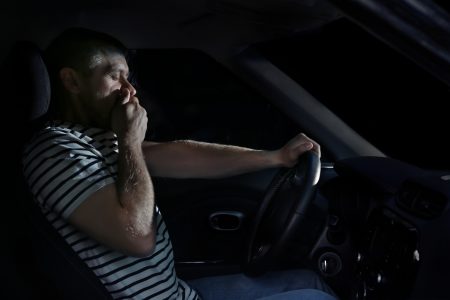We’d all agree that it’s negligent for a driver to fall asleep while driving down the road. It seems so clear, in fact, that there wouldn’t be any need to have lawsuits that address it. But there are. Over the years many cases have been decided to determine whether a driver who falls asleep at the wheel and causes a crash is negligent — or worse than negligent, “reckless.”
While every case has its own unique facts, over the years the Connecticut courts have come to recognize that falling asleep at the wheel doesn’t happen in a flash. It’s not like turning off a light switch and the room suddenly goes dark. In the case of falling asleep while driving, there’s usually a period of “drowsiness” beforehand. We all know the feeling: we’ve been driving for hours, the highway is monotonous and we just want to close our eyes and take a nap — but we know better. Either pull over, stop and rest, or get some sleep, or risk a serious crash. In one case a truck driver was aware of his drowsy condition, but, being behind schedule, he kept driving. He then fell asleep, went off the road, flipped the truck and crashed, killing one passenger and injuring another. The Court recognized that sleep ordinarily doesn’t occur without warning. It’s preceded by the warning of drowsiness, dozing off, even drooping of the eyelids, and bobbing of one’s head. When the truck driver disregarded his own sleepiness, and made the decision to keep going, he crossed the line into “reckless” driving, meaning, heedless and wanton misconduct as to the safety of others. Kakluskas V. Somers Motor Lines, Inc, 135 Conn. 35.

Being found “reckless” while driving subjects the reckless driver to “punitive damages” — an additional level of damages that are intended to punish the person who acts with such reckless disregard. Note: car insurance companies – which protect people who are “negligent” behind the wheel and cause damage – do not cover “reckless” driving. That means that a driver found by a Court to be “reckless” and is assessed with “punitive” damages, is personally and individually responsible to pay for the punitive damages awarded. The insurance company is not responsible for the driver’s reckless driving punitive damages.
The law requires all drivers to “maintain vigilance at all times.” That’s why texting while driving can be deemed reckless driving, especially where it results in a serious accident.
Remember: Drowsiness while driving is an important warning sign before falling totally asleep. Failure to heed it can have serious medical, legal & financial consequences.




